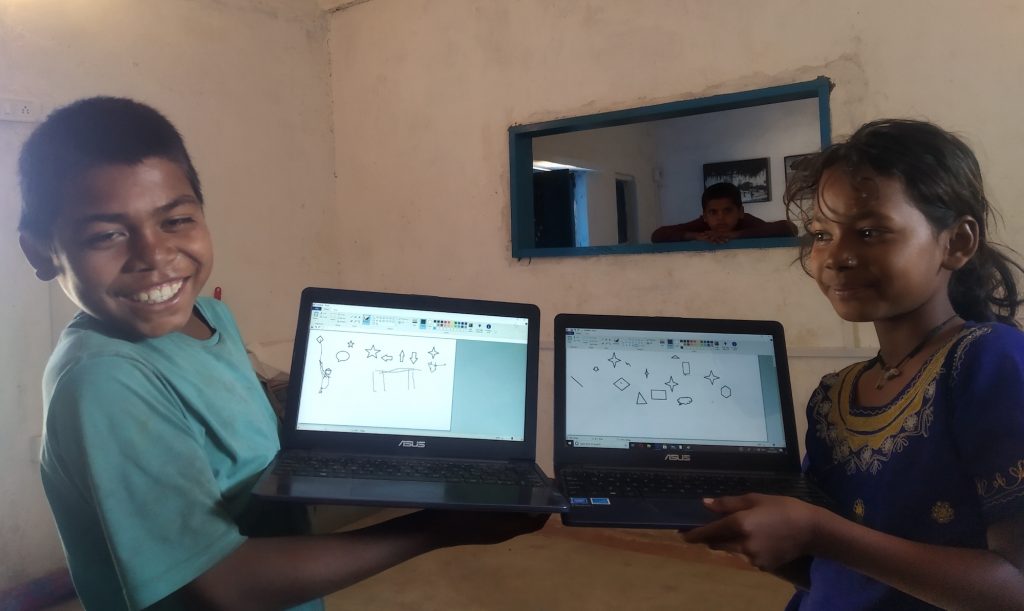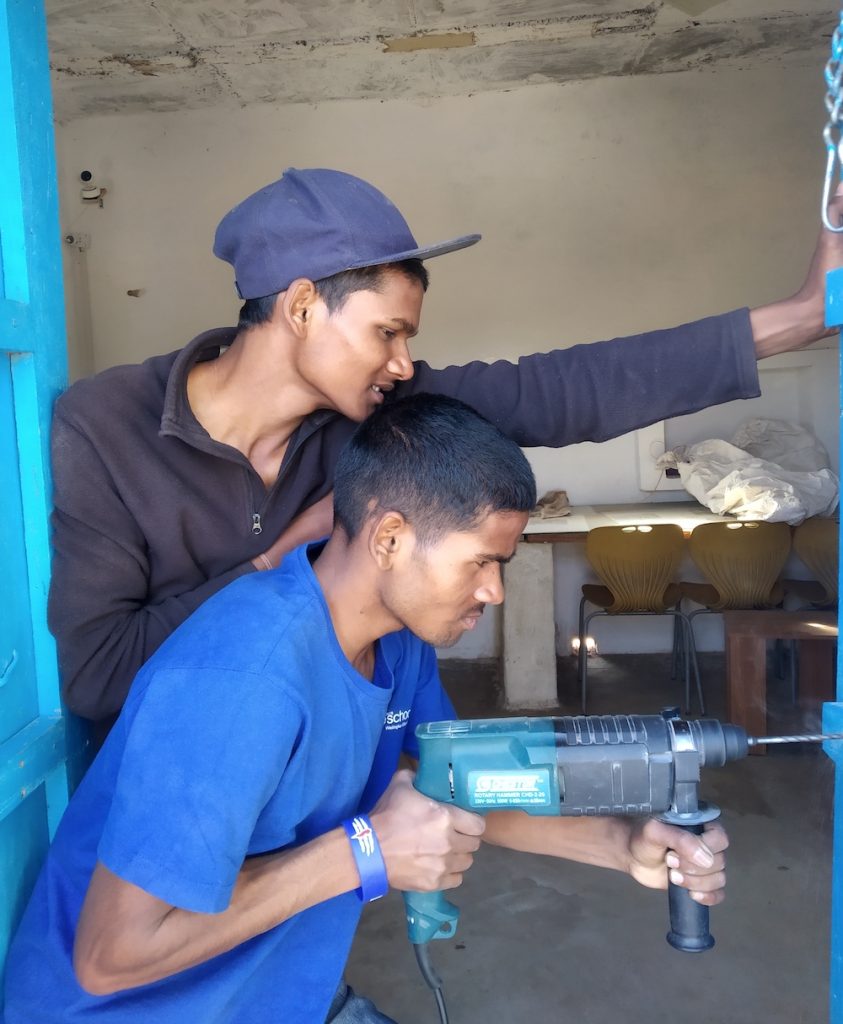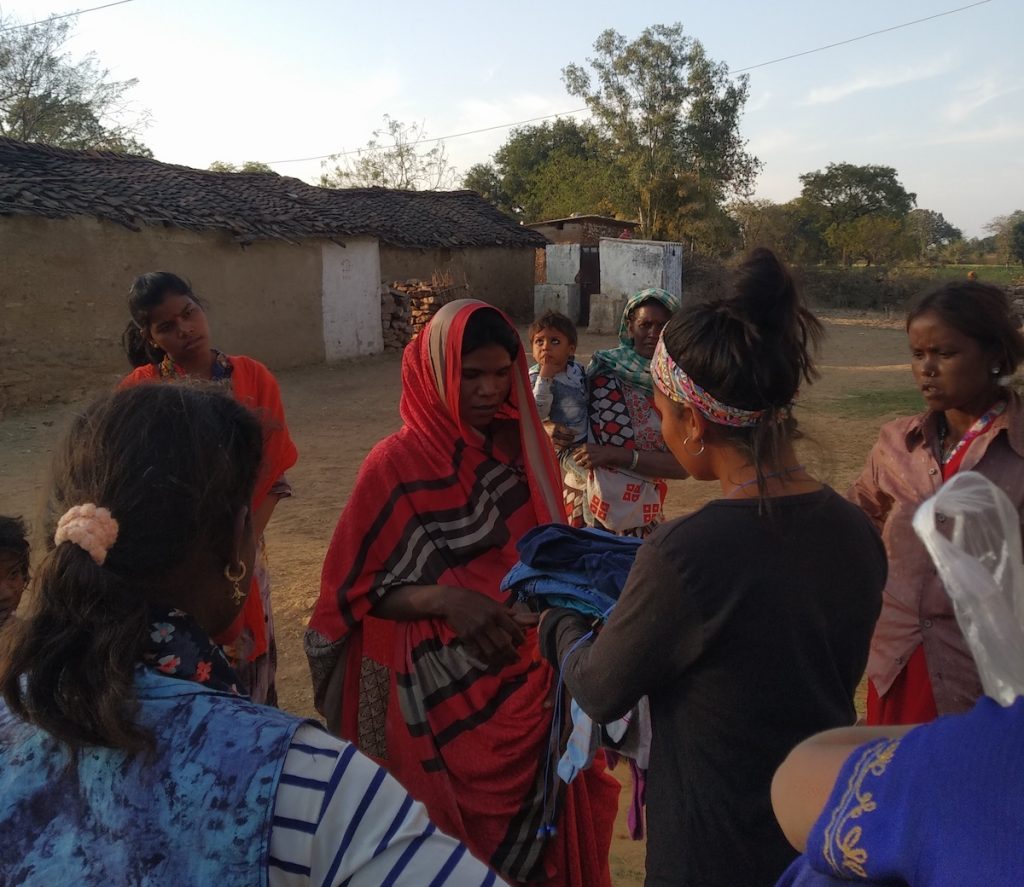By Abhishek Singh
You can download the report as a PDF-file here:
I was always intrigued by the power of sports, how sports can help for personal development. When I heard about Janwaar Castle from a friend, I didn’t need to think twice before sending an email to offer my services. Ulrike replied with a simple ‘YES’ and so my journey in Janwaar began!
I started as a volunteer and slowly evolved into one of the mentors in the Open School project. I came to Janwaar for one month but one single evening event in the Villa inspired me to stay. The five teenage Open Schoolers had prepared short talks on their Open School experiences and presented them to the villagers. The room downstairs was packed with parents and kids. Wen the Five talked about gender equality and caste discrimination in front of the villagers there was dead silence in the room. It was the first time ever that theses issues were brought up in public and it was the night when the kids really challenged their parents. I wanted to be part of this!
Neither Ulrike nor one of the mentors have been in Janwaar since March 2020. The lockdown has shifted all our communication and sessions online. We felt it was high time to go back to Janwaar and to see what was happening. So Ulrike and I decided that I should go to soak in the village vibes and re-start face-to-face-activities.
My main focus of work was:
- Open School Project / Education
- Fix all the needs of the Villa Janwaar, our Community Center
- Talk to the villagers and take in the village vibes
Education
During lockdown I was connected with the kids more or less on a daily basis. I had online sessions with Anil on Data Entry, India and the world, Economics and Business studies. I myself was learning a lot. I structured the sessions, thought about what I wanted to achieve with each session (=learning outcome), I wondered which learning material to use (games, videos, text books …) and I discussed openly with Anil our evaluation, what we had achieved.
I also mentored Asha and Poorti, the two girls in our Open School Project, to create their schedules for the exams and for their activities with the other kids. Passing on learning is a central part of the Open School Project. So we do take this seriously.
In Janwaar my role changed. I no longer gave sessions, I was the kids’ sparring partner in conversations. I was an observer and enabler – in one line: I became the interface between Ulrike, the kids and the village.
The first thing I realized was that the Open Schoolers didn’t talk much with each other. They didn’t share their studies, problems and successes. For us sharing means caring, understanding the other person, working as a team. This sense of being a team had suffered a lot during the pandemic. Everyone was following their own paths, the team spirit was almost gone. This needed to be fixed.
I started one-to-one sessions. Arun and Asha started sharing quickly but it was not the same for Anil. He was struggling in working according to his schedule and seemed very quiet when asked about his studies. Eventually when I connected with him more personally and not only for education, he began to speak. Asha spoke about the lack of help in Villa from the boys (Anil and Arun), Arun opened up about the pressure from his family to earn money and Anil told us about the various teen distractions in his life. These insights helped us to understand their feelings and perspectives better and based on this we were able to re-adjust and bring back the team spirit.
The next step was to make them talk to each other. We started by having dinner together – twice a week. The dinners were hosted by different families of the village and we will continue to practice this. The purpose is to encourage the Open Schoolers to talk to each other, share their feelings and help each other. At the same time these dinners provide income to the families who make the food. While I was in Janwaar the Open Schoolers had three dinners together. Dinnertime has helped the kids to talk about the issues which require their combined effort. They created a list of the kids who will receive the new skateboards, they discussed the status of their sessions, and they talked about the skateboarding championship in April. The next step is to share their feelings, the issues they face, the small successes and their ideas. This will enhance their team spirit and will enable them to help each other much more effectively.
At the same time we launched the dinnertime we also launched ‘Love Night’. ‘Love Night’ took place at our Villa Janwaar. It is open for all the village kids. They come together and tell one specific thing they like about one other kid. At first, the kids were shy to compliment their friends in public. Once the older kids took the lead, the younger ones joined as well. They said things like: he plays with me or he always has my back or she has a beautiful smile. Though simple, their compliments were more than enough to please the recipient child.
The kids loved ‘Love Night’ and after the first night they immediately asked to do it again the next day. They are still very shy to speak about the other gender and someone other than their close friend. But we’ll see where it will go.
The common dinner time twice a week and a weekly Love Night with all the kids will surely reignite the team spirit which made the Janwaar kids unique.
I encouraged the older kids to install the computers, robotic kits and other games in the upstairs rooms of our Villa Janwaar. This was the beginning of our maker space in Janwaar. Seeed Studio and David Li from Shenzen, China, the DIY capitol of the world, as well as DLabs in Ahmedabad helped us to set up a hackerspace in Janwaar. They advised us on the various programmes we can start with the kids and donated robotics and arduino kits and some very interesting games. The maker space is an open space to explore technology, experiment and share knowledge. The kids showed immense interest in the computers and all the gadgets. During my presence we kept the Villa open for longer hours than usual. This encouraged kids from other parts of the village and even the girls to come to the Villa more often.

Some of the kids embraced the computers, overcame their fear and learned using Paint, a painting program. Anil, one of our Open Schoolers is pretty much computer savvy, so he has taken over and is passing on his learning in technology and robotics to the younger kids. I helped him to make a detailed schedule for his sessions with the kids. Anil is in the process of unlearning the traditional idea of teaching – standing in front of a crowd and preaching what the crowd should learn – and instead thinking of ways to make the sessions more engaging for the kids. He created groups and gave tasks for each group to complete. This made the learning fun, pushed the kids to work and learn and inculcated a spirit of teamwork in them. Anil and Asha are now more or less on track with their sessions. We need to improve their preparations for these sessions.
Asha, Arun, Poorti and Anil are sitting for the NIOS examination in April-May this year. I am helping them to renew their schedules which includes all topics/subjects which need to be covered for the exams. Each of them has now a customized proper schedule which he/she can follow on a daily basis and helps him/her to complete all subjects at least once before the exams.
I also talked to the middle aged kids (11-15 years of age) – Poorti, Kalpana, and Vinay – about public speaking. A film team from the History TV channel came to cover the Janwaar Story for their show OMG: Yeh Mera India. They were planning to interview the middle aged kids. Unfortunately these kids had no camera experience and were too shy to talk. It was a pity because they would certainly enrich the conversation. The good news is that they are ready to learn. So we will include public speaking in our next kids-to-kids sessions and I will work in additional one-to-one sessions with them when I am back next month in Janwaar. The first step for them is to talk in front of the other children. Vinay has started conducting exercise sessions in the morning and Poorti took storytelling sessions with the kids. It’s a start.
Villa Janwaar
Ulrike told me on my first day in Janwaar – and I still remember this – your job is to see what is not working and then fix it!
This is an uncommon idea in India. We are raised with the idea of ignoring – ignore the garbage, ignore the traffic, ignore the rules and on and on. So, my job this time was to fix the mess which had piled up during the lockdown. And while fixing it I was enabling the youth of Janwaar to join me and get it done by OURSELVES.
DIY became our motto – and we made it. Kids felt proud of their achievement as they created things on their own. The excitement in the younger kids was contagious as they wanted to help everywhere.

First, we cleaned the mess created by Veer Singh (our landlord) in front of the Villa. We removed the gravel and stones and made the front entrance accessible again. We installed new locks and an iron window at the Villa to keep the computers safe. And we installed digital cameras. We white washed the boundary walls of the Villa and now the kids have a huge canvas to paint on! We also fixed the swing which is adored by the younger kids.
The first steps are made – during my next visit there will be more to do. We have to complete the painting of the walls, install more gadgets in our maker space and get permanent wifi in the Villa.
Village Vibes
There is a feeling of jealousy in the village. It is actually not surprising. Some villagers feel that we overreach the quarter of the village which is close to Villa Janwaar and the new skatepark. This can easily be true, because over the course of the last 10 months when there was neither a mentor nor Ulrike in the village, these jobs were done by our Open Schoolers. So they might have been tempted to prefer themselves. So we addressed the issue immediately.
Asha and I went to those villagers who had raised concerns. They complained of not getting any blankets or warm clothes this winter. The blankets and the woolen clothes were meant for the poorest of the families to sustain their journey. She complained that though she has a bike, an auto and fields, their family is in huge debt. That’s why they don’t have enough money to buy clothes for the kids. She had also restricted her kids from going to the Villa. We tried to explain to her that we gave the winter survival package only to the poorest of the poor in the village. Not everyone had received it. And we didn’t consider her family being part of the poorest of the poor because they own land and hire labour. We couldn’t convince her 100% but the lady cooled down when he offered that I can eat food at their house. Hosting guests generates income for the families and allows them to spend more money on clothes or blankets. So I ate at their house for a few days before changing for another family of the village. This allowed me to understand the other parts of the village better and provided more families additional income.

We asked ladies from various parts of the village to work at the Villa – so that more and more families will benefit once again from our activities. While I was in Janwaar we received a big parcel from Ulrike’s friends in Germany, we especially included the families away from the Villa and gave them the clothes. We want all parts of the village to benefit and not just one quarter. Our efforts have calmed the complaints in the village a bit. But more needs to be done.
During my conversations with Arun I learned that his family is facing money problems. They had taken a loan to buy a motorbike – now they struggle to pay the monthly installments. So they demanded their kids to work in the fields instead of studying. I discussed the idea that if their kids can give sessions to the other kids in the Villa, whatever we pay them will help the family and the children to continue their studies. They liked the idea and Anil, one of their sons and a good Open Schooler, began to hold sessions.
I also talked with Shivraj. Shivraj is 18 years old. He was the first one in the village who received a scholarship but unfortunately stopped studying. He has started coming back to the Villa and is helping us in the DIY process. He is currently in Noida with two other villagers building small playgrounds and a new skatepark at Prakriti School, our cooperation partner in the Open School Project. He will make good money there – double the amount he would make in the village – so he can support his family.
Summary and Outlook
To summarize, the major outcome of my visit were:
- Increase in communication between all the Open Schoolers
- Increase in the opening hours of the Villa
- Addressing the issue of jealousy in the village
- Beginning of the maker space in Janwaar
I will be back in Janwaar on March1. These are the areas I surely will work on:
- Completing the process to get a passport for Anil
- Painting the Villa Janwaar
- Taking the maker space ahead
- Improve Asha’s and Anil’s schedule for the kids
- Ensure Anil and Asha stick to their own daily schedule
- Keep encouraging the middle aged kids to speak and learn more through one-on-one sessions
- Keep encouraging the Open Schoolers to talk among themselves – use the dinnertime and love night
- Build and distribute skateboards, especially in the other areas of the village
3 thoughts to “Monthly Report Feb. 2021”
Loved this post from Abhishek! I can’t wait to come visit one day soon!
Thanks Tipton! We would also love to host you in our village. Where are you from? How did you came to know about us?
Tipton just did a frundraiser for us. He is living in the US and has started an organisation called Give skate.